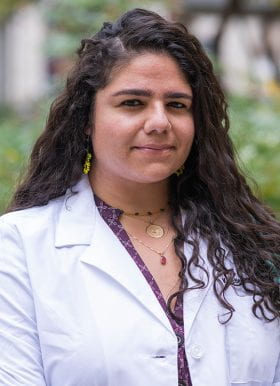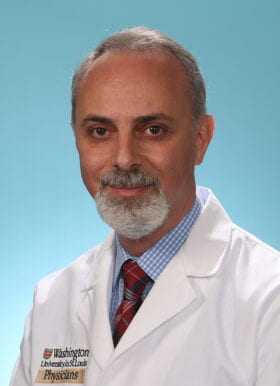A tumor is an abnormal growth of body tissue or fluid, usually resulting from uncontrolled cell growth. There are multiple classes or types of tumors. Tumors can be cancerous, sometimes called “malignant,” or noncancerous, also called “benign.”
A solid tumor is an abnormal mass of tissue that create a single mass or many masses, while liquid tumors circulate throughout the body through the bloodstream. Like other tumors, solid tumors can be malignant or benign. These tumors can affect one part of the body or a number of body systems.
Solid tumors can occur at all ages. They can be found in babies, young children, adolescents and young adults. Some children are born with solid tumors.
Different types of solid tumors tend to occur in different parts of the body. Some tumors have signs and symptoms that make them easier to recognize. Others have fewer specific signs and are often harder to detect. Some children may be very ill when they first develop a solid tumor, but others may not have any symptoms.
Washington University Pediatric Surgeons provide high-quality care to children with solid tumor conditions through a comprehensive Solid Tumor Program. Our surgeons are part of a multidisciplinary team of experts at St. Louis Children’s Hospital, all working together to find the best treatment for your child. We keep up-to-date on the most recent advances in diagnosing and treating tumors.
Solid tumors are a diverse set of conditions that require specialized approaches to diagnosis and treatment. Some children may be treated through surgery alone, but others require chemotherapy or radiation. Some may require all three treatment regimens.
Our team provides care for many types of solid tumors. These cancers often affect more than one system, so our specialists work together to deliver the right care for each child.
Washington University Pediatric Surgeons offer a variety of surgical treatments for children with these and other rare and multi-systemic cancers:
Wilms tumor
A rare kidney cancer that primarily affects children and is the most common pediatric kidney cancer. Also known as nephroblastoma.
Neuroblastoma
A cancer that develops from immature nerve cells located in several areas of the body. It most commonly happens in and around the adrenal glands. The adrenal glands are small glands on top of both kidneys that produce hormones that help the body perform essential functions.
Soft tissue sarcomas
A broad category of cancers that start in soft tissues, including muscle, tendons, fat, vessels and nerves. These cancers can develop anywhere in the body.
- Rhabdomyosarcoma: Rhabdomyosarcoma is a type of sarcoma, which is cancer of soft tissue (i.e. muscle), connective tissue (i.e. tendon or cartilage), or bone. Rhabdomyosarcoma usually begins in muscles attached to bones, but it may begin in many places in the body.
- Non-Rhabdomyosarcoma soft tissue sarcomas (NRSTS): Soft-tissue sarcomas that are not rhabdomyosarcomas are referred to as non-rhabdomyosarcoma soft tissue sarcomas, or NRSTS. Many types of NRSTS cancers exist, including fibrosarcoma, leiomyosarcoma, liposarcoma, neurofibrosarcoma, peripheral nerve sheath tumors and synovial sarcoma.
Mediastinal and chest tumors
Tumors that form in the part of the chest that separates the lungs (the mediastinum) or in the chest region. These growths may impact the heart, aorta, esophagus, thymus, trachea, lymph nodes and nerves.
Germ cell tumors
Germ cell tumors are growths of cells that grow from reproductive cells. These tumors may be cancerous or not cancerous.
Liver tumors
- Hepatoblastoma (HB): In hepatoblastoma, cancerous (malignant) cells form in the liver. It is the most common type of childhood liver cancer, usually affecting children younger than 3 years old.
- Other liver tumors: Other liver tumors which develop in children include hepatocellular carcinoma (HCC), which is malignant, hepatocellular adenomas (HCAs), hemangiomas, hamartomas, and focal nodular hyperplasia (FNH), which are benign.
Ewing sarcoma
Ewing sarcoma is a type of tumor that forms from a certain kind of cell in bone or soft tissue. It often occurs in children and young adults, beginning in the legs, pelvis and arms.
Desmoplastic small round cell tumors
Desmoplastic small round cell tumors, or DSRCT, are tumors that grow in the abdomen and pelvic region. DSRCTs are a type of soft tissue sarcoma, which is a type of cancer that forms in the soft tissue.
Pancreatic tumors
- Solid Pseudopapillary Neoplasm of the Pancreas (SPN): Solid pseudopapillary neoplasm, or SPN, of the pancreas is a very rare type of neoplasm, usually characterized by an encapsulated mass of cells. This is a “low malignant potential” tumor, meaning that the abnormal cell growth is less likely to spread.
- Other pancreas tumors: Other pancreatic tumors in children include pancreatoblastoma, pancreatic carcinoma and islet cell tumors (also known as neuroendocrine tumors, or NETs). Of the islet cell tumors, there are multiple types, including gastrinomas, glucagonomas, insulinomas, non-functioning tumors, somatostatinomas, and VIPomas.
Tumors of the GI tract (benign and malignant)
Gastrointestinal stromal tumors (GISTs) start in the wall of the stomach or small intestine. GISTs often grow in the empty space inside the gastrointestinal (GI) tract, and the tumors themselves can be either benign or malignant.
Metastatic tumors
The process by which tumors or cancerous cells spread to other parts of the body is called metastasis. Tumors that spread from where they started to another distant part of the body are called metastatic tumors. For many types of cancer, metastatic cancer is referred to as stage IV (4) cancer.
A specific metastatic tumor treated in the program is osteosarcoma which has spread to the lungs.
Ovarian tumors
Ovarian tumors can form in infants, young children, and adolescents on one or both ovaries. The ovaries are organs that store and release eggs and produce hormones. Ovarian tumors are different from ovarian cysts, and they are often benign.
When you come to St. Louis Children’s Hospital, you and your child will see a cancer specialist and a surgeon. The team will evaluate your child’s condition and work with you to choose a care plan that works best for both patient and family. Your child’s case will be presented in front of dozens of doctors and other medical professionals at a tumor board.
St. Louis Children’s Hospital provides access to all sorts of minimally invasive techniques, which means that recovery for your child will be faster and easier. The program also offers many novel techniques for surgery, such as heated intraperitoneal chemotherapy (HIPEC) procedures.
Minimally Invasive Surgery
Minimally invasive surgeries and procedures for solid tumor treatment are designed to shorten the healing time for patients. These include laparoscopic (abdominal) and thoracoscopic (chest) procedures. Surgeons also use special ways of identifying tumors, like indocyanine green (ICP) imaging. This technique is used to identify and localize tumors for more accurate surgical removal. Minimally invasive surgeries have advanced with the use of robotic surgical technologies, which are used at St. Louis Children’s Hospital.
HIPEC
HIPEC is a new and successful process for cancerous tumor treatment. Cytoreductive surgery (CRS) is performed first to decrease tumor burdens by removing small and large tumors from the inner lining abdominal wall, called the peritoneum. Surgery may or may not remove the peritoneum. If cytoreduction (the removal of cancerous growths) is adequate, treatment will proceed with HIPEC. In this procedure, surgical tubes called cannulas are placed in the abdomen to carry warm fluids and chemotherapy into the abdominal cavity. Post-operation recovery and observation in the hospital usually lasts 5-7 days without complications, and follow-up appointments help confirm the success of treatment.
Surgeons in the program also work with a multitude of experts, including anesthesia and anesthesiologists, to prioritize pain control and comfort for your child.
The Washington University Pediatric Solid Tumor Program builds treatment plans through multidisciplinary teams specially crafted to each unique experience of childhood cancer. Our surgeons work with pediatric oncologists, radiologists, pathologists and any other specialists your child needs to provide personalized solutions for their health and for your family. We are also the only pediatric providers, and our program has a high volume, which is shown consistently to improve treatment outcomes.

Amy E. Armstrong, MD
Oncology
- Pediatric oncology
- Pediatric solid tumors
- NFI-related peripheral nervous system tumors

Patrick A. Dillon, MD
Associate Professor of Surgery
- Phone: 314-454-6022
Program Director, Pediatric Surgery Fellowship

Steven Don, MD
Radiology
- Digital imaging
- Radiation dose reduction
- Effects of noise on image perception
Contact Us
To request an appointment, please call 314-454-6022 or fill out the form below.
Location and contact:
Suite 6110 – Campus Box 8235
One Children’s Place
St. Louis, Mo 63110
(314) 454-6022
For referring physicians:
We appreciate the opportunity to care for your patients. Our team of specialists includes pediatric oncologists, radiologists and surgeons, as well as the multidisciplinary expertise of Washington University Physicians and Siteman Kids at St. Louis Children’s Hospital. We are committed to the successful treatment and life-long health of your patients.











